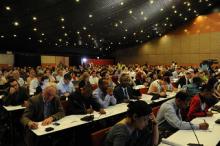
A new briefing by the Climate Finance Advisory Service (CFAS) highlights the key climate finance issues on the agenda of the Conference of the Parties (COP) and the Conference of the Parties serving as the meeting of Parties to the Kyoto Protocol (CMP) at their meeting in Lima Peru in December 2014. The CFAS Guide: The Status of Climate Finance at COP20, Lima is authored by David Eckstein and Alpha Kaloga (Germanwatch), Alix Mazounie (RAC-France), Sven Harmeling (CARE), Raju Chhetri (independent consultant) and Henriette Imelda (IESR), with support from Sönke Kreft (Germanwatch).
Many climate negotiators and observers see climate finance as one of the linchpins holding together the entire international climate negotiation process. First, climate finance is key to closing gaps: delivering funds to implement mitigation and adaptation activities is required to ensure the highest possible efforts. For mitigation, this means keeping the planet on a pathway that limits global warming to 2°C or less; for adaptation, this means enabling climate-resilient development. Second, the provision of climate finance fulfils developed countries’ financial commitments to developing countries under UNFCCC obligations. Third, some stakeholders maintain that developed countries, which provide the means to implement climate change projects (finance, technology and capacity building) will determine developing countries’ level of commitment and buy-in to a new climate deal in 2015.
There is only one year left before the COP in Paris, where the Parties are expected to adopt a protocol – another legal instrument or an agreed outcome with legal force under the UNFCCC – that is applicable to all Parties. There are few political openings left to reassure developing countries that their domestic climate actions will receive commensurate international support. In this context, the COP in Lima is a critical opportunity to provide the necessary predictability, which is currently missing in the negotiations.






